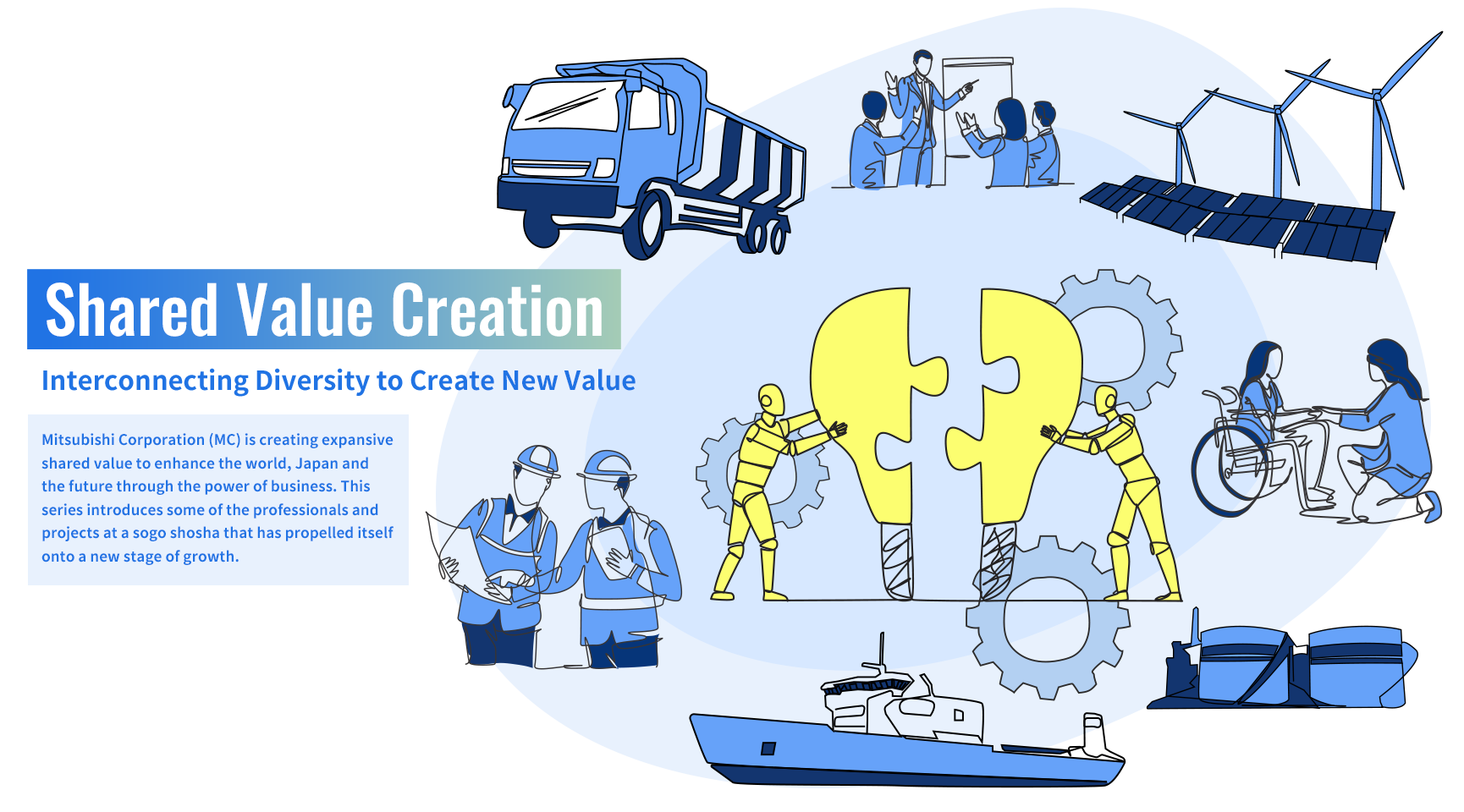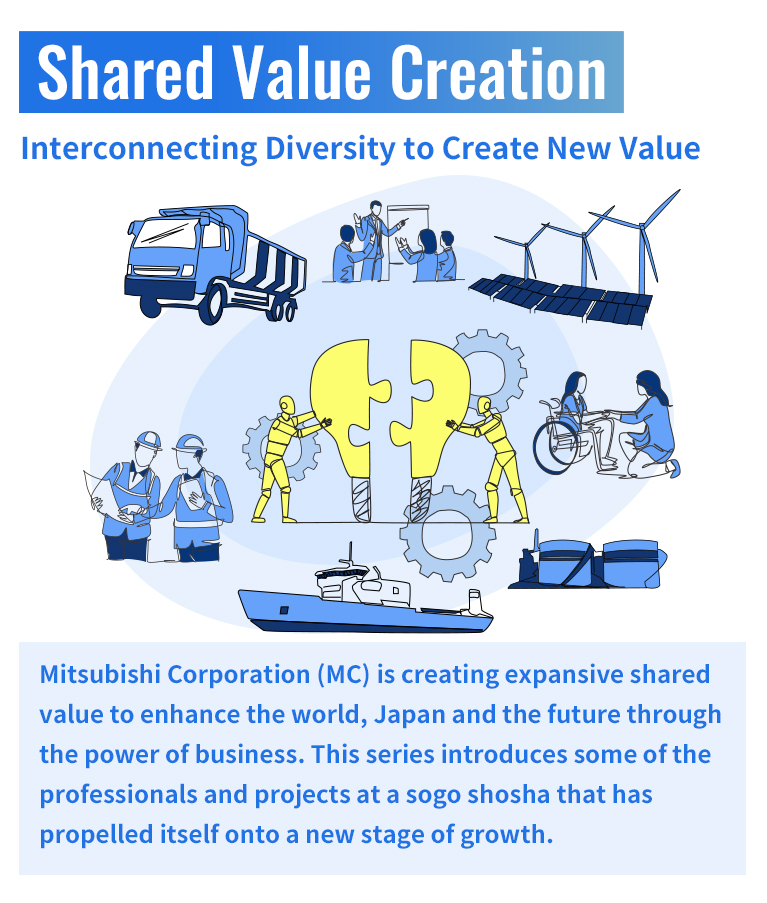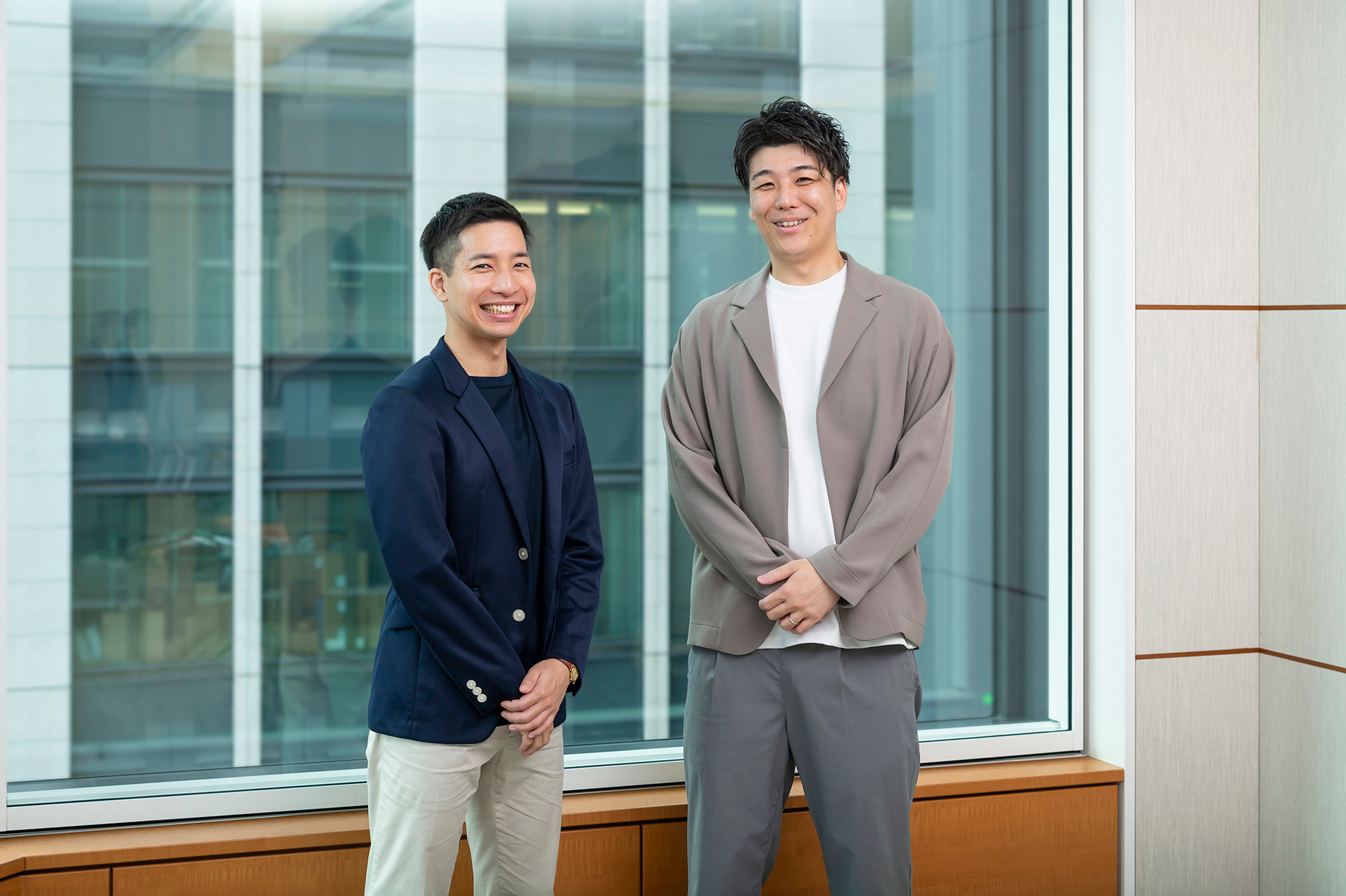In July 2024, MC and Honda Motor Co., Ltd. (Honda) established their 50-50 joint venture ALTNA Co., Ltd. (ALTNA). The new company's mission is to help bring down the barriers to EV penetration and decarbonization.
In the second half of our roundtable discussion with MC's e-Mobility Solutions Division, Asahi GLOBE+ Editor in Chief Kazuhiro Sekine speaks with two of the division's members who are currently on secondment at ALTNA. They share their thoughts on the joint venture's new businesses and future possibilities in mobility.
-

Yusuke Honda
General Manager
Energy Solutions Department
ALTNA Co., Ltd.
*Currently on secondment from MC -

Takehiro Tobimatsu
General Manager
Corporate Planning Department
ALTNA Co., Ltd.
*Currently on secondment from MC
Scarce Resources Outflow and Urgent Need for Circulation Establishment for Japan
—— When I interviewed Division COO Takeuchi, I asked him about growth in the global EV market, the situation in Japan, and the origins and aims of MC's e-Mobility Solutions Division. Mr. Tobimatsu, what's your take on challenges in the EV market?

Tobimatsu
There are a lot of challenges in this market, but at ALTNA we're focusing on three in particular.
The first is the fact that most EV batteries are leaving Japan as part of used EVs that are being exported overseas. Each of those batteries is essentially a bundle of scarce resources, but they're escaping to other countries because Japan doesn't have a system to organically circulate used EV batteries. The global struggle to secure those resources is only going to intensify in the coming years, so developing such a system is a matter of great urgency, one that even stands to impact the very strength of our nation.
The second problem is the high upfront ownership cost of EVs compared to gasoline-powered vehicles. Obvsiously this is partly because the batteries are very expensive, but our lack of any effective means of pricing used EVs is also a major factor* here. If we hope to grow Japan's EV market, we'll need to come up with ways to reduce the cost of ownership.
*See the first half of our roundtable discussion for more information.
The third problem is the demand-supply gap in renewable power generation. Because EVs run on electricity, the more of them we have on our streets, the more power we're going to have to generate. Decarbonizing power generation is clearly important, but an unfortunate characteristic of renewables like solar and wind, is that their capacities rely heavily on climate, time of day and other natural circumstances.
This is why we have no choice but to waste the surplus power generated by solar facilities during clear, sunny weather, because our grid can only handle so much. Conversely, when the sun goes down in the evenings coincides with when most people are returning home from work or school and increasing household power consumption. So you can see how this creates an imbalance between demand and supply. Storage-battery technologies will play a big role in correcting that imbalance and ensuring more effective use of renewable energies.
MC-Honda J/V ALTNA Commences Operations in Summer 2024
—— So was ALTNA established to solve these problems?

Tobimatsu Yes, in terms of growing Japan's EV market and helping our country attain decarbonization, both Honda and MC share the same sense of crisis and are facing similar challenges. After two years of in-depth meetings, we decided to set up this 50-50 joint venture in July 2024. ALTNA combines our companies' respective strengths, Honda's being EVs and technologies (battery-control systems, connected technologies, etc.) and MC's being expertise in electric power businesses, including battery management, smart charging. Our joint venture's aims are to develop new kinds of mobility services and power projects.
—— What does the name ALTNA mean? How did you arrive at ALTNA?
Tobimatsu The ALTNA stands for alternatives, as in alternative materials, componenets and options. Until now, gasoline-powered cars have been the mainstream choice in the global auto market,however, the EV options is going to become more accesible in the coming years.We can also see a shift in the ways people use vehicles. Traditionally, people have 'owned' cars, however, we will likely see more people opting to simply 'use'-i.e. lease- them instead. Another meaning of alternative that's embodied by our joint venture's name is our determination to demonstrate not only new, but also completely unprecedented concepts designed to achieve carbon neutrality and resource circulation.
Leveraging a Battery-leasing Business to Offer Affordable EV Leases
—— Please tell us more about ALTNA's battery-leasing operations, which comprise one of the company's three business areas.

Tobimatsu Sure, in reply to Honda's launch of the N-VAN e:, -their new compact, lightweight EV- in Octover 2024, the respective leasing arms of MC and Honda joined forces to offer buyers of the EV some new kinds of lease plans. Customers who purchase one of those plans concedes ownership of their EV's battery during the lease period to ALTNA, which monitors its performance and state. By continuous monitoring the batteries, ALTNA will over time become better equipped to estimate future battery degradation, which should raise market trust in EVs, including the state of health (SOH) of their batteries. It should also lead to more long-term battery usage, from the moment the cars roll new off the line until they are later sold and driven as used vehicles. As has been the case up to now, EV users will still lease the vehicles from leasing companies, but the cost of doing so will be less.
—— The idea of a company owning the batteries partially is quite unique.
Tobimatsu
You're right, it is. We refer to the concept of separating ownership of the cars and their batteries as EV decoupling. In this particular scheme, ALTNA will only own the batteries.
Division COO Takeuchi explained how Japan lacks the means to accurately assess the state* of EV batteries, but by both owning and monitoring the batteries, ALTNA will be able to deliver leased EVs that customers can trust, even if the vehicles are used.
*See the first half of our roundtable discussion
—— How will this business lower the cost of leasing an EV?
Tobimatsu
Most of the EVs used in Japan end up being exported, even when their batteries still have value. I'll explain more about ALTNA's battery-repurposing operations in a moment, but essentially the work involves reinstalling used EV batteries as fixed storage batteries in power grids.* To return the profits from that business back to EV users, we offer them more affordable EV leases.
*Fixed storage batteries in poewr grids are sometimes directly installed at power generation plants, transformers and other such facilities for charging and discharging.
Our business presents people with alternative options of choosing EV's over gasoline-powered vehicles and leasing over ownership, which therefore perfectly embodies our joint venture's name.
Energy storage business with repurposed batteries and Contributing to Renewables Growth
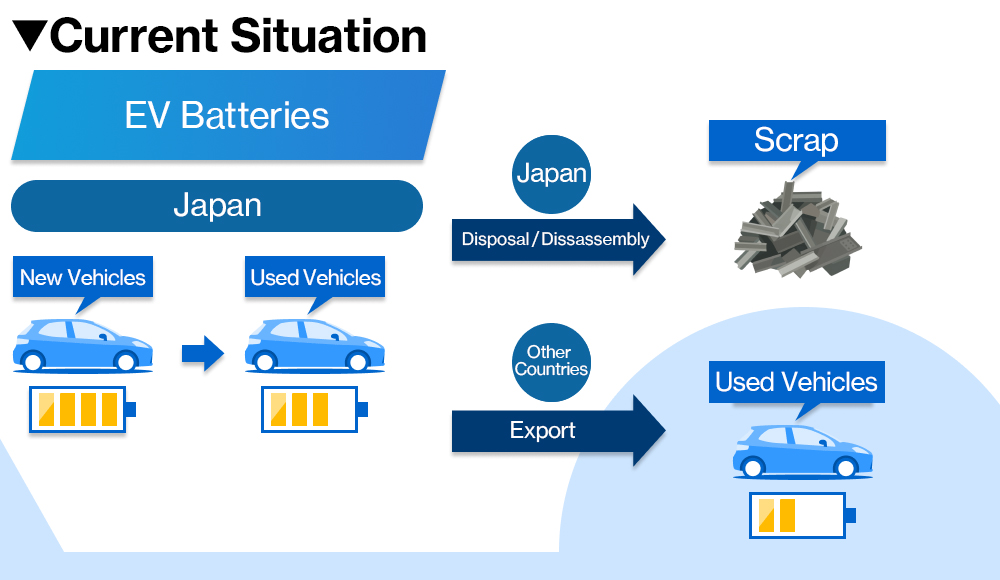
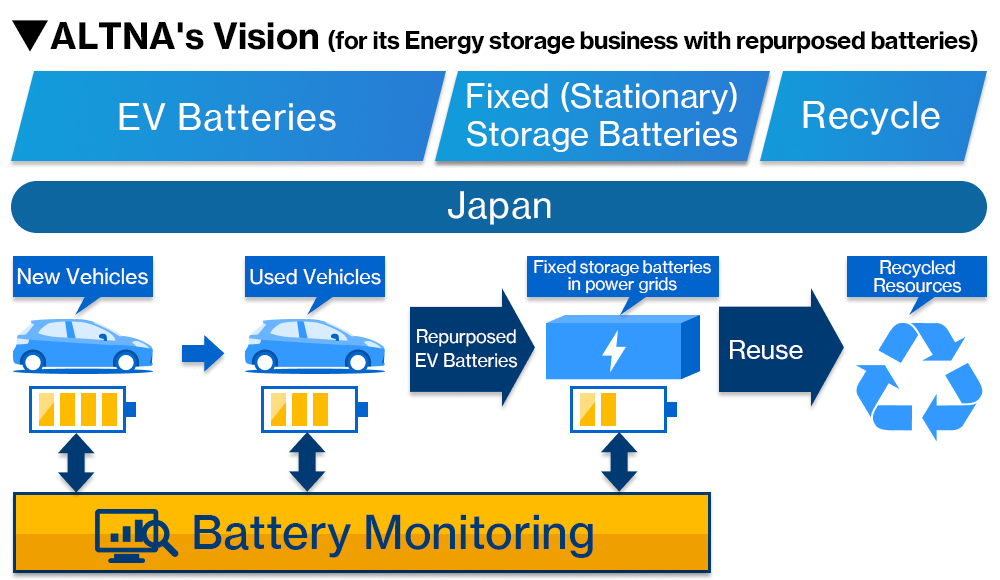
—— As you mentioned earlier, could you provide us some more details on ALTNA's repurposing operations?
Tobimatsu Yes, we take batteries from the leased EVs that finished serving their purpose and transfer them into fixed storage batteries in power grids. Our repurposing operations also involve managing the secondary use of the batteries. The fixed storage batteries discharge electricity when grid output is insufficient to meet demand. Conversely, they are used to charge the batteries when there is energy surplus. This system will play a very important role in balancing power-grid supply and demand, in part because it will adjust for the time-and-weather related imbalances I spoke about earlier that are inherent to renewables. It will also help to expand the use of renewables, as it will alleviate concerns about their intermittent nature making them less reliable sources of energy. ALTNA plans to develop an electric-power business that repurposes EV batteries as fixed storage batteries.
—— What kind of electric-power business utilizes repurposed batteries?
Tobimatsu We envision this business as the process of installing several repurposed EV batteries at a power station and managing their operation there. We expect that this will become a substantial means of supporting power-grid stability. In addition, by utilizing the collected data through monitoring ALTNA's battery performance during their initial uses in Evs, we should be able to ensure their stable, long-term operations. We are also exploring a variety of tech-based solutions to make the batteries more efficient.
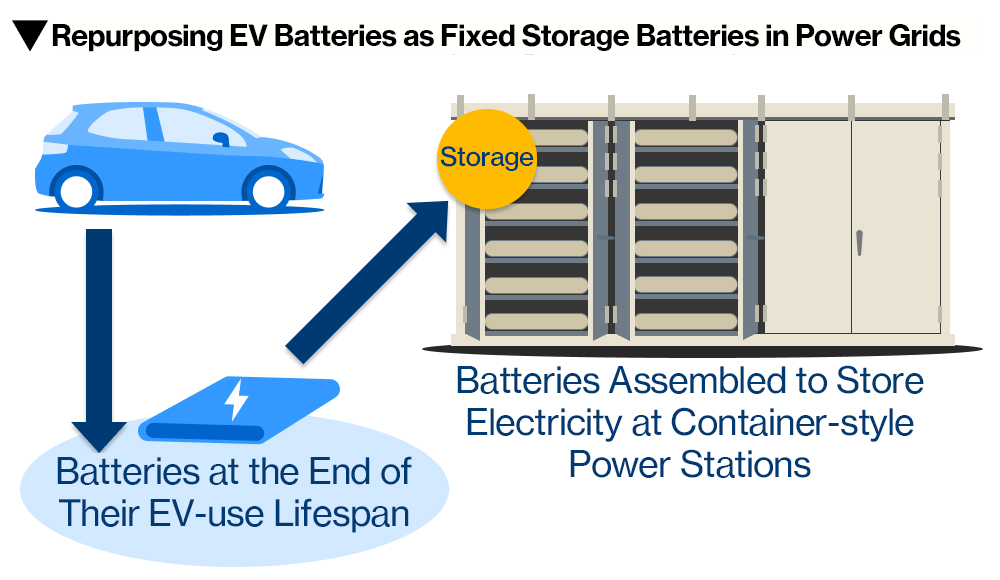
—— What happens to the batteries at the end of their secondary lifespans providing power-system storage?
Tobimatsu Once the batteries have served their secondary purposes, our plans is to recycle them. This kind of circular system will also help prevent the scarce resources being exported of the country. We hope to eventually achieve a perfect system of resource circulation, whereby the recycled materials are used to make new EV batteries.
Leveraging Smart-charging Business to Optimize Electricity Costs
—— Mr. Honda, can you tell us about ALTNA's third core business, the smart charging?

Honda Sure. This business is essentially the provision of a service that uses the company's energy-control system to charge EVs during times with the lowest electricity prices. For example, let's say that EV users comes home and starts charging their vehicles at 7 p.m.. If they intend to next use their vehicles at 8 a.m. the following day, the system will automatically charge the car during the hours between 7 o'clock that evening and 8 o'clock the next morning when electricity prices are cheapest. Even though users don't have to do anything other than plug in the car and tell the system when they next need it, they can save on their money.
—— Does that mean ALTNA is closely monitoring the grid to determine when energy costs are lowest?
Honda Wholesale energy prices tend to rise when insufficient grid output tightens supply. Conversely, prices will drop when surplus output slackens demand. At ALTNA, we'll use our advanced energy-control technology to constantly monitor both this supply-and-demand balance and wholesale energy prices. This will enable us to offer customers plans that optimize electricity costs by timing the charging of their EVs accordingly. In response to the expanding EV market, there is a furthur concern of excessive stress on our power grid due to concentrated demand coming from most people charging vehicles at night. However, we believe that this business will contribute to alleviate these predictions as well.
—— It sounds like smart charging will also result in more effective use of renewables.
Honda Absolutely. Japan is trying to decarbonize by growing its use of renewables; in other words, connecting large capacities of green energy to the grid. Doing so requires the ability to absorb, control and adjust for fluctuations in output. Because smart charging systems can charge vehicles when there's excess green energy from the grid, EV batteries can play a role in those adjustments and help us adopt and use renewables more efficiently.
—— What's ALTNA's future vision for its smart-charging business?
Honda Right now, ALTNA is focusing on a one-way control smart-charging technology. It controls the grid-to-vehicle charging by timing it in accordance with grid conditions. On the other hand, our medium- to long-term objective is to develop technology that will also facilitate discharging from the EV batteries to the grid, or in other words, V2G (Vehicle-to-Grid) systems. There are still a lot of systems-and-tech related hurdles that need to be overcome before we can achieve that objective, but if we create a commercially viable V2G business, it will help raise the value of EVs by providing them with an energy-storage function. This should lead to more growth in the EV market. Our first goal is to make a successful business out of our smart-charging platform, and then we'll work on developing a V2G model. These are ALTNA's current blueprints.
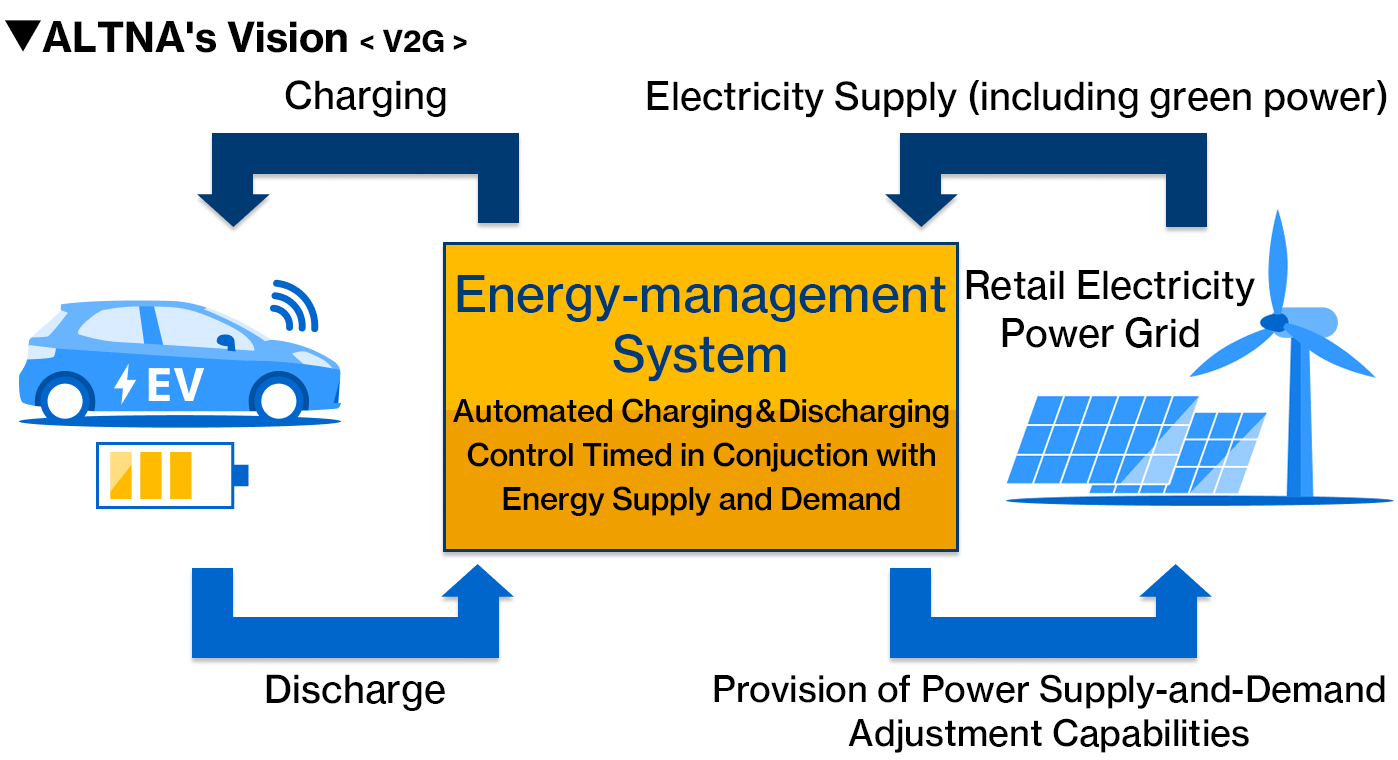
More than Just Modes of Transport - Creating New EV Value!
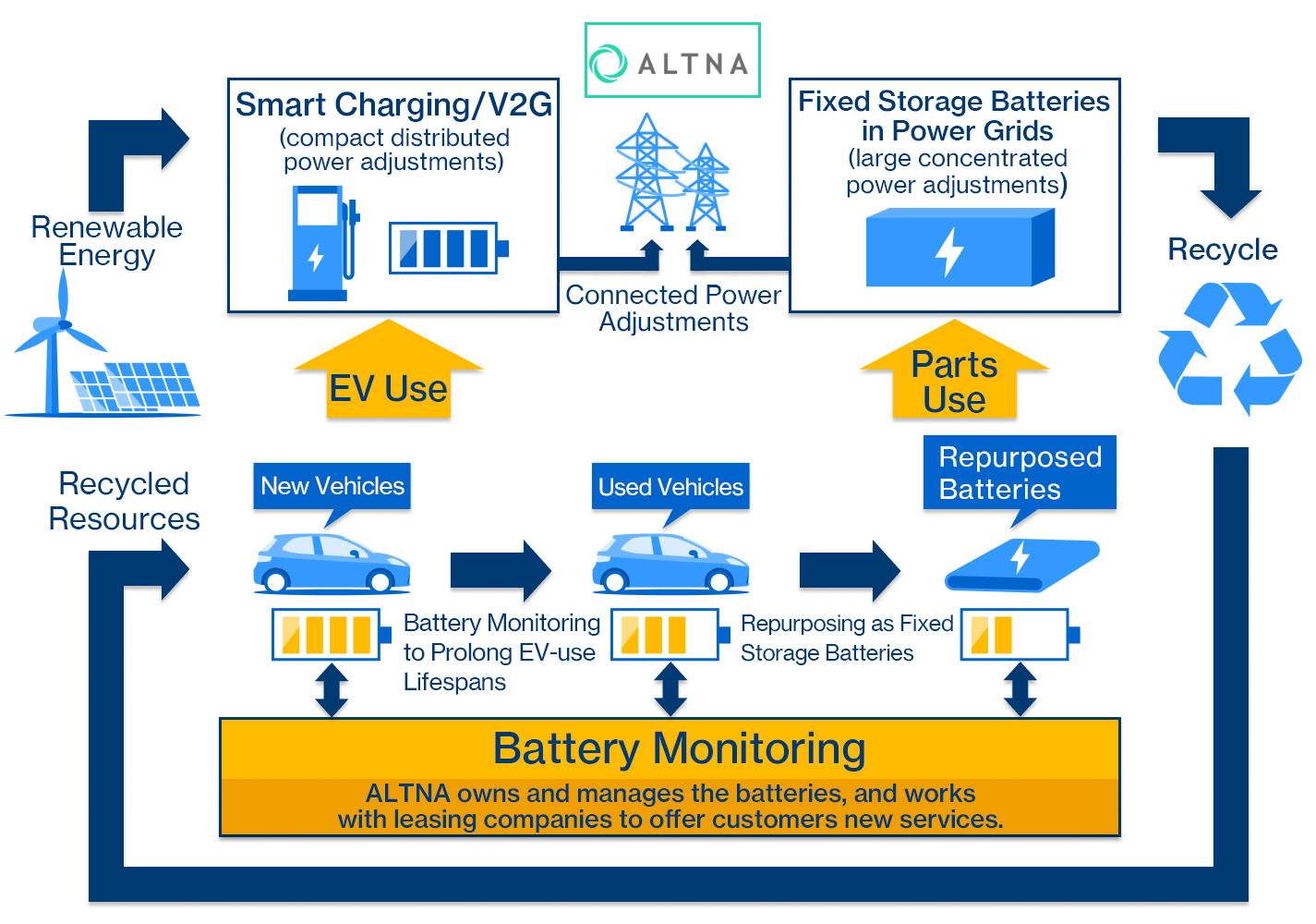
—— I'd like to thank you both for explaining these completely new businesses to us. I can see how their impacts actually extend outside the mobility space.
Tobimatsu That's right. Today we've talked about ALTNA's three core businesses of battery leasing, batttery repurposing and smart charging, but I'm confident that our company's operations will expand even more in the coming years. ALTNA's businesses are invested in growing Japan's EV market, but they're also addressing societal challenges like decarbonization and resource circulation. I think teaming up with more like-minded stakeholders who share our ambitions will give us all the power to reshape the futures of mobility, energy and society. Honda An interesting statistic shows that most privately used automobiles are driven for just 10% of their existence. In other words, each day on average, a typical car spends about two hours being driven and 22 hours sitting parked somewhere. The V2G concept I mentioned earlier is about using EVs as storage batteries during that parking time. By giving EVs value and function beyond a means of transportation, we believe we can help grow their future demand.
Relishing the Thrill of Challenges that Exceed Our Original Ambitions
—— What's the atmosphere like at ALTNA? For example, what influences have the employees gotten from their peers from Honda?

Tobimatsu ALTNA has integrated workforces from two different companies, but none of us are really conscious of being "from MC" or "from Honda." Regardless of which of our two parents we hail from, our backgrounds are diverse to begin with. For example, some of us worked in the real-estate or electrical-power sectors, while others were involved in automotive businesses, battery-related operations, management planning, and so on. We've built a very good rapport with one another, partly because we acknowledge and respect one another's specialized expertise. Honda I agree. Even during our most heated discussions, we always respect and trust our colleagues. Every day, I'm reminded that MC and Honda have very similar corporate cultures. A characteristic shared by Honda's people is that they're always questioning how things are new, why they're needed, and who's going to benefit from them. They've made for a very stimulating environment at ALTNA. Tobimatsu There certainly have been many moments during our discussions when we've been forced to reset because someone from Honda has said, "Wait a minute, exactly how does this idea benefit the world again?" They've shown us places where we've needed to stop focusing on profits and get back to basics, and they'll frequently refer to the beliefs, words and actions of their company founder, Shoichiro Honda. I think it's great that the philosophies of such a legendary entrepreneur have now sunk in with all of employees. To add on, ALTNA has set up its headquarters in a shared office space, and its casual atmosphere and employees' attire have a real venture-capital vibe. The way both of us are dressed today probably betrays that, but I think we feel comfortable this way because our company encourages us to work with open minds. After all, how we dress affects how we act.
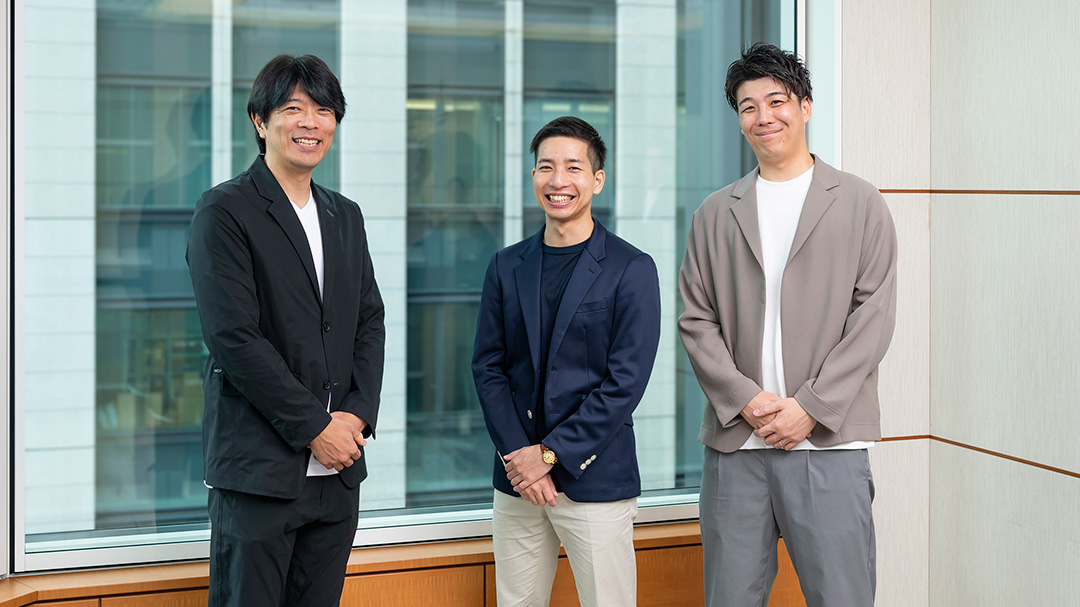
—— I'd like to conclude our discussion by asking each of you about your expectations for these businesses.
Honda I feel that the borders between industries are gradually diminishing. In the mobility sector, parallel advances are being made in electrification and software, as evidenced by EVs being equipped with communication systems enabling their remote control. Inseparable connections to the electric-power industry have already been made. Businesses that create new value in this fashion, by marrying mobility with other sectors, are both fascinating and exciting to us. Inter-business connectivity is precisely why collaborations with first-rate partners are essential. Running businesses with Honda and other partners from Japan and around the world does present its fair share of challenges, but the rewards definitely outnumber the difficulties. I'm looking forward to working with them and taking these businesses to new heights. Tobimatsu ALTNA is only just up and running, so there are bound to be unexpected problems ahead. Whatever happens though, none of us will forget our original aspiration when we formed this joint venture, which is to create business for humankind, and that's what will continue to inspire us to take on new challenges.
